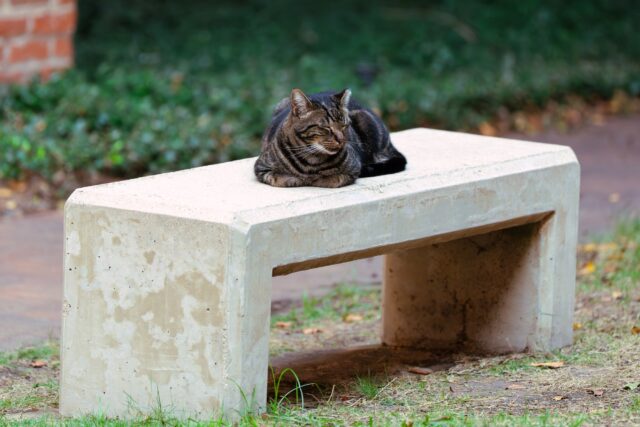By Kaylee Hayes | Reporter
Baylor’s updated Animals on Campus Policy, enacted on July 28, 2025, altered the management of community cats around campus, creating new challenges for local trap-neuter-return groups and reducing student involvement in longstanding animal welfare efforts.
The policy, which now bans feeding cats on university grounds and categorizes them alongside wildlife, has prompted significant operational changes for organizations that support community cat populations in the Baylor area.
University spokesperson Lori Fogleman discussed the reasons for the change in a statement, highlighting safety and damage concerns.
“Over the years, skunks, raccoons and other wild animals continued to be drawn to the food left on campus for feral cats. In addition to posing a health and safety risk to Baylor students, faculty, staff and visitors, the wild animals have caused tens of thousands of dollars in damage to Baylor’s buildings, offices and research laboratories in recent months,” the statement reads. “Baylor’s Animals on Campus Policy does restrict the feeding, watering and sheltering of feral cats in order to make Baylor’s campus less inviting for wild animals.”
Sylvia Campos, director of the Waco Animal Advocacy Group and a member of the City of Waco’s Animal Welfare Board, said the policy change affected TNR coordination almost immediately. Baylor allegedly made the adjustment overnight, with no notice to TNR groups, she said.
“Everyone in the TNR community as a whole was shocked,” Campos said.
Campos said Baylor was using pest control to remove the cats on campus and animal advocacy groups across Waco repeatedly requested clarity from Baylor and were unaware of what was happening.
“We didn’t know what they were doing with the cats after they trapped them,” Campos said. “We didn’t know how and if they were disposing of them or releasing them.”
Campos said the policy shift has been clear in their monthly data.
“We have monthly numbers, and you can see it in them,” Campos said. “Students used to get involved with the TNR process and even fostering, but now, not so much.”
For many years, Baylor-area TNR efforts relied on coordination among faculty, staff, students and the Animal Birth Control Clinic, which has operated TNR in Waco since 2004.
This collaboration contributed to healthier community-cat colonies, said ABC executive director Carrie Spivey, whose clinic has performed more than 2,100 TNR surgeries this year alone.
“When we began on campus, there were a lot of kittens and behavioral issues,” Spivey said. “Intact cats cause a lot of behavioral problems.”
TNR has significantly reduced those issues over time, according to Spivey. Most Baylor-area cats today are already spayed or neutered, vaccinated and ear-tipped for identification, but she emphasized that the feeding ban now changes the way caretakers operate.
“Cats depend on humans; not feeding them is not a humane practice,” Spivey said.
Despite the new restrictions, advocates emphasized that students can still assist community cats without violating Baylor policy.
Cypress senior Addison Machann, the program developer with the Humane Society of Central Texas, said students can participate in off-campus TNR work, foster through local rescues and report unaltered or newly appearing cats to ABC.
“There are positives and negatives in terms of animal welfare on campus,” Machann said.
He emphasized that student involvement remains important to maintaining humane practices in the Baylor area.
“It’s getting to the time of year where cats or kittens will be in your car hood or somewhere else without you knowing it,” Machann said.
Local TNR advocates like Spivey said their goal is not to challenge Baylor’s updated regulations, but to ensure students understand how the changes affect community cats, especially as new cats continue to migrate toward the campus’ green spaces, parking lots and building perimeters.
“This is about community responsibility,” Spivey said. “Baylor is a big part of this community.”


